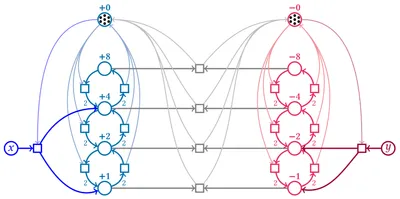Theory and Foundations News
Archive news content can be found here.
Best Paper Award at STOC 2019
 The contribution The Reachability Problem for Petri Nets is Not Elementary by Wojciech Czerwinski, Slawomir Lasota, Ranko Lazic, Jerome Leroux and Filip Mazowiecki has won a Best Paper Award at the 51st Annual ACM Symposium on the Theory of Computing, to be held on June 23-26, 2019 in Phoenix, AZ.
The contribution The Reachability Problem for Petri Nets is Not Elementary by Wojciech Czerwinski, Slawomir Lasota, Ranko Lazic, Jerome Leroux and Filip Mazowiecki has won a Best Paper Award at the 51st Annual ACM Symposium on the Theory of Computing, to be held on June 23-26, 2019 in Phoenix, AZ.
This work, which was supported by a Leverhulme Research Fellowship, shows that the central verification problem for Petri nets is much harder than has been known since the landmark result of Richard Lipton in 1976. Petri nets, also known as vector addition systems, are a long established model of concurrency with extensive applications in modelling and analysis of hardware, software and database systems, as well as chemical, biological and business processes.
Facebook Fellowship awarded to Jeremias Knoblauch
Jeremias Knoblauch, a second year PhD student supervised by Dr. Theo Damoulas (Warwick CS & Stats), has been selected as the first graduate student based in the UK and as one of only 21 graduate students worldwide to receive the Facebook Fellowship award.
Professor Feng Hao provided Royal Society International Collaboration Award

Royal Society has provided an International Collaboration Award of £225,000 to Professor Feng Hao in the Department of Computer Science, University of Warwick to build an international collaboration with Professor Bimal Kumar Roy of the Indian Statistical Institute on “strengthening e-voting in India”. The project will run from December 2018 to December 2021.
India is the largest democracy in the world by population. As of today, Electronic voting machines (EVMs) have replaced paper ballots in all national and general elections in the country. The aim of this international collaboration is to develop an electronic voting process that will be fully verifiable, hence providing stronger guarantees on the tallying integrity of an election. This builds on the UK team’s leading research on end-to-end verifiable e-voting without tallying authorities (also known as "self-enforcing e-voting") and the India team's strength on cryptography and statistics research. The success of this project will not only provide an invaluable case study, but also a potentially portable solution for other countries that face similar development problems in deploying e-voting securely (e.g., Brazil, Nigeria).
About Royal Society International Collaboration Award
The Global Challenges Research Fund (GCRF) is a £1.5 billion fund announced by the UK Government to support cutting-edge research that addresses the challenges faced by developing or Low and Middle Income countries (LMICs). As part of the GCRF, the Royal Society has launched an International Collaboration award to enable outstanding UK research leaders to develop international collaborations with the best leading researchers from around the world. The award is for three years and offers an exciting opportunity to foster and promote international collaboration between outstanding research groups in the UK and overseas, with a view to supporting work on global challenges and problems facing developing countries.
More details about this award can be found at: https://royalsociety.org/grants-schemes-awards/grants/international-collaborations/
